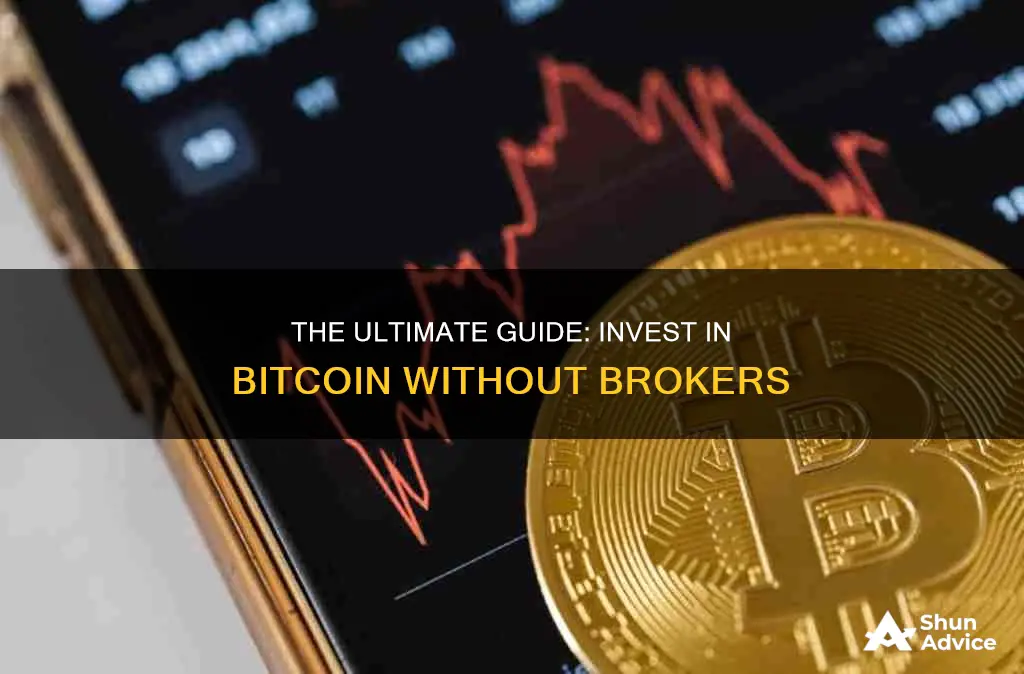
Investing in Bitcoin can be a complex process, especially for those new to the world of cryptocurrency. However, there are several ways to buy Bitcoin without a broker. Here are some of the most common methods:
- Cryptocurrency Exchanges: You can purchase Bitcoin from various cryptocurrency exchanges, such as Gemini, Kraken, Coinbase, and Crypto.com. These platforms typically offer a range of cryptocurrencies and carry different fees and consumer protections.
- Bitcoin ATMs: These machines function like regular ATMs and are often found in convenience stores. You can use them to buy and sell Bitcoin, but be sure to check the fees and have a plan for where to send your Bitcoin after purchase.
- Peer-to-Peer Money Transfer Apps: Cash transfer services like PayPal, Venmo, or Cash App allow users to buy, store, send, and sell Bitcoin directly through their apps.
- Bitcoin Exchange-Traded Funds (ETFs): The Securities and Exchange Commission recently approved spot Bitcoin ETFs, which track Bitcoin's price and trade on major exchanges. These ETFs are available through traditional brokerage accounts.
- Digital Wallets: A do-it-all digital wallet can be used to store various cryptocurrencies and purchase Bitcoin, usually with a charge card. Popular options include Atomic Wallet and Exodus.
| Characteristics | Values |
|---|---|
| Digital wallet | A secure, encrypted location where you store your cryptocurrencies. |
| Digital wallet providers | Atomic Wallet, Exodus, Robinhood, Coinbase, Kraken, Gemini, Binance, Crypto.com |
| Payment methods | Credit/debit card, bank transfer, e-wallet, PayPal, Skrill, Neteller |
| Minimum investment | $10 |
| Minimum deposit | $10 |
| Fees | 5% fee per transaction, 0.75% spread-based structure quoted at 0.75% for BTC trading, 0.1% maker/taker fee |
| Other ways to buy Bitcoin | Bitcoin ATMs, stockbrokers, peer-to-peer money transfer apps, exchange-traded funds |
What You'll Learn

Choose a digital wallet
A digital wallet is a secure, encrypted location where you can store your cryptocurrencies. You can choose between a hot wallet or a cold wallet.
A hot wallet is a software-based storage solution that is connected to the internet. It is usually accessible via an app or website on a computer or mobile device. Software wallets are prone to viruses, malware, and hackers, so it is important to add two-factor authentication to enhance security. Examples of hot wallets include Exodus and Mycelium.
A cold wallet, on the other hand, is a physical, portable device that is not connected to the internet. It provides an added level of security for your coins and passkeys. However, if you lose the keycode or the device breaks, you may never be able to retrieve your cryptocurrency. Examples of cold wallets include Ledger and Trezor.
When choosing a digital wallet, consider factors such as security, cost, user experience, supported cryptocurrencies, and customer satisfaction. It is also important to select a wallet that works well with larger exchanges to facilitate quick transactions.
- Ledger Nano X: Ledger is a well-known name in crypto cold wallets. The Nano X is a second-generation hardware wallet that connects to your device via USB or Bluetooth. It supports over 5,500 cryptocurrencies and has an intuitive user interface.
- Trezor Model T: Trezor is another reputable brand for crypto cold storage. The Model T offers a strong security track record and features, such as a touchscreen and a MicroSD card slot. It supports over 16 cryptocurrencies and can access third-party exchanges directly through its web interface.
- Exodus: Exodus is a free desktop and mobile wallet with a straightforward interface and a built-in exchange. It offers good customer support and the option to set custom fees. However, it is a closed-source wallet, which may raise security concerns for some users.
- Mycelium: Mycelium is an open-source and mobile-only Bitcoin wallet. It offers customizable transaction fees and the ability to use hardware wallets. However, it only supports Bitcoin, ETH, and ERC-20 tokens and may be confusing for first-time users.
- Atomic Wallet: Atomic is a popular laptop/desktop wallet that accommodates Bitcoin and about 300 other cryptos. It is highly secure as you hold the private keys. You can buy Bitcoin with a VISA or Mastercard, and there is also an Atomic app that syncs with your desktop installation.
- Zengo Wallet: Zengo is a next-generation wallet that claims to enhance security while doing away with the challenges of managing private keys and seed phrases. It secures assets and performs transactions using multi-party computation (MPC) cryptography. However, it does not offer a downloadable desktop version and lacks support for some popular cryptocurrencies.
- Coinbase Wallet: Coinbase Wallet is a separate product from the Coinbase exchange, allowing users to store cryptocurrency themselves. It easily integrates with the Coinbase exchange and offers mobile and browser-based connections to decentralized applications.
Remember, it is a good idea to use multiple wallets to reduce the risk of your cryptocurrency keys being compromised and to separate and store different crypto coins.
Gulf Coin: A Smart Investment Move?
You may want to see also

Visit a Bitcoin ATM
Bitcoin ATMs are a popular way to buy or sell Bitcoin, bypassing the traditional banking system. They are similar to regular ATMs in that they are physical kiosks, but they connect to a Bitcoin wallet instead of a bank account. You can buy Bitcoin with cash or a debit card, and some machines also allow you to sell Bitcoin for cash.
There are currently around 28,000-31,000 Bitcoin ATMs globally, with the majority located in North America. You can find your nearest Bitcoin ATM by using an online service such as Coin ATM Radar, which provides a live map of Bitcoin ATM locations.
To use a Bitcoin ATM, you will typically need to follow these steps:
- Insert your phone number: This is required for identity verification. You will receive a verification code via text message, which you then input into the machine.
- Verify your identity: This may also involve scanning a valid government-issued ID, such as a driver's license, or providing a fingerprint.
- Scan your Bitcoin wallet QR code: You will need a Bitcoin wallet address to receive the BTC. If you don't have one, you can create one by using a paper wallet, an application, or an address on an exchange.
- Insert your fiat currency: Place your cash into the machine, and it will display how much Bitcoin you will receive.
- Confirm the amount and complete the transaction: Once you are happy with the exchange rate, press "Buy" or "Confirm". The Bitcoin will then be sent to your Bitcoin wallet address.
It's important to note that Bitcoin ATM fees are typically high, ranging from 7% to 25%. There may also be limits on the amount of cash you can deposit or withdraw, and most locations will require identity verification.
Peter Jones' Bitcoin Loophole: A Smart Investment?
You may want to see also

Buy Bitcoin using a stockbroker
If you're looking to buy Bitcoin without a broker, one option is to use a traditional stockbroker. However, the choices among traditional brokers that allow customers to buy and sell Bitcoin are limited. Robinhood was the first mainstream investment broker to offer Bitcoin trading (Robinhood Crypto is available in most but not all U.S. states). Like its stock-trading platform, Robinhood charges no fees for Bitcoin trades. Other online brokers that offer access to Bitcoin or other cryptocurrencies include Webull, TradeStation, and Fidelity.
Another option is to use a regular stockbroker to buy into crypto funds. These are known as Exchange-Traded Products (ETPs) and include exchange-traded funds (ETFs), exchange-traded notes (ETNs), and exchange-traded cryptocurrencies (ETCs). While Bitcoin and crypto ETFs are not yet available in Europe and the U.S., they are available in Canada and Brazil. Some popular ETPs include:
- BTCetc – Physical Bitcoin ETC (Germany)
- WisdomTree Bitcoin ETP (BTCW SW) – Jersey
- 21Shares Bitcoin ETP (ABTC SW) – Switzerland
- VanEck Vectors Bitcoin ETN – Liechtenstein
It's important to note that, unlike ETFs, ETNs and ETCs are structured as unsecured debt, meaning the issuer may not be able to repay the principal and default on the bond. Additionally, fees and costs vary among these options, so be sure to do your research before choosing one.
When buying Bitcoin through a stockbroker, it's crucial to consider the risks and potential rewards. Bitcoin is a bet on the cryptocurrency space and the specific technology behind it. Both are relatively new and untested, and there is no guarantee they will reach their projected potential. Therefore, it's essential to do your due diligence and carefully assess the pros and cons of each service before investing.
The Rich and Bitcoin: A Lucrative Investment Strategy?
You may want to see also

Use a peer-to-peer money transfer app
There are several peer-to-peer money transfer apps that allow users to buy, store, send and sell Bitcoin. These include Cash App, PayPal, Venmo, and Crypto.com.
Cash App is a money transfer app created by Block Inc. that allows people to send money via their Cash App balance, linked bank account, credit card or debit card. The service also offers an optional debit card, which allows users to spend their Cash App balance at different retailers. Cash App also allows users to invest in stocks and buy and sell Bitcoin. However, Cash App charges a 3% fee to people who use a credit card to send money and a 0.5%-1.75% fee for instant cash-out deposits.
PayPal allows users to send money via a linked bank account, debit or credit card. The service has high transfer limits, allowing users to send up to $60,000 in a single transaction. However, sending money via credit card, debit card or PayPal Credit incurs a 2.9% transaction fee, and transferring money to your bank account immediately incurs a 1.75% fee.
Venmo is owned by PayPal but has some different functionality. It allows users to send money via a linked bank account, Venmo balance or credit card. Like Cash App, Venmo offers a free, optional debit card. However, there is a 3% fee to send money via credit card and a 1.75% fee for instant cash-out transfers to your bank account.
Crypto.com supports over 350 cryptocurrencies and provides a range of crypto products. The mobile app allows users to buy, sell, trade and earn interest on their crypto. However, Crypto.com charges trading fees of up to 0.075% for users who do not trade at higher volumes.
It is important to note that while peer-to-peer transactions can offer more privacy than traditional online transactions, they are also associated with security issues.
Strategizing Bitcoin Halving: A Guide to Investing Wisely
You may want to see also

Invest in Bitcoin stocks
If you're wondering how to invest in Bitcoin stocks, this refers to the process of purchasing shares of companies that have a relationship with Bitcoin.
How to Invest in Bitcoin Stocks:
First, you need to choose a broker or a crypto exchange. While either lets you buy crypto, there are differences to keep in mind. Cryptocurrency exchanges are platforms where buyers and sellers meet to trade cryptocurrencies. They often have lower fees but can be more complex and intimidating for new crypto investors. Cryptocurrency brokers, on the other hand, offer easy-to-use interfaces but may charge higher fees.
Once you've chosen a platform, you'll need to create and verify your account. Depending on the platform and the amount you plan to buy, you may need to verify your identity to prevent fraud and meet regulatory requirements.
Next, you'll need to deposit money into your account. You can do this by linking your bank account, authorizing a wire transfer, or even using a debit or credit card. Keep in mind that using a credit card can be risky and expensive due to higher interest rates and additional cash advance fees.
After you have funds in your account, you can place your first cryptocurrency order. Remember that Bitcoin and other cryptocurrencies are volatile and risky investments, so it's important to carefully consider your goals and strategy before investing.
Finally, select a storage method for your Bitcoin. You can leave it on the exchange in a "hot wallet" or transfer it to a separate "cold wallet" for more security. Hot wallets are online wallets that are convenient but carry a higher risk of theft since they are connected to the internet. Cold wallets, on the other hand, are offline wallets or hardware wallets that are not connected to the internet, making them more secure.
Where to Invest in Bitcoin Stocks:
- EToro: A well-known trading platform with over 23 million registered users, operating in over 100 countries. eToro is regulated by multiple top-tier entities and charges a spread-based structure of 0.75% for BTC trading. It offers a unique 'CopyPortfolio' feature, and there are no deposit or monthly account fees.
- Binance: The world's largest cryptocurrency exchange, with over $22.6 billion in trading volume in the last 24 hours. Binance offers a vast asset selection, with over 500 crypto assets to trade, and charges low fees of 0.1% maker/taker fee.
- Robinhood: One of the first mainstream investment brokers to offer Bitcoin trading, with no fees for cryptocurrency trades.
- Webull: An online broker that offers access to Bitcoin and other cryptocurrencies.
- TradeStation: Another online broker that provides access to Bitcoin and other crypto trading.
- Fidelity: A traditional broker that began offering Bitcoin investing for 401(k) accounts in 2022.
Tips for Investing in Bitcoin:
- It's recommended to invest no more than 10% of your portfolio in risky assets like Bitcoin.
- Don't take on credit card debt to invest in Bitcoin.
- Understand the lack of investor protections in the cryptocurrency market. Bitcoin investments are not insured in the same way as traditional stock brokerage accounts.
- Always use a secure, private internet connection when making financial transactions online.
- Be aware that Bitcoin's price is highly volatile, and it's difficult to find the "right time" to buy or sell.
AI-Assisted Bitcoin Investment: Strategies for Success
You may want to see also
Frequently asked questions
Some popular cryptocurrency exchanges that allow users to buy Bitcoin include Coinbase, Gemini, Kraken, Binance, Crypto.com, and eToro.
Cryptocurrency exchanges offer a variety of features, multiple cryptocurrency options, and lower fees compared to brokers.
You can typically use a bank account, debit card, or credit card to buy Bitcoin. Some exchanges may also accept payments through e-wallets such as PayPal, Skrill, or Neteller.
Yes, you can buy Bitcoin through a peer-to-peer money transfer app such as PayPal, Venmo, or Cash App. You can also use Bitcoin ATMs, which function like regular ATMs and are often found in convenience stores. Additionally, you can invest in Bitcoin stocks by purchasing shares of companies that have a relationship with Bitcoin, such as Coinbase or Riot Blockchain.
It's important to do your research and understand the risks and potential rewards of investing in Bitcoin. Consider your risk tolerance and financial goals, and don't invest more than you can afford to lose. It's also crucial to use a secure, private internet connection when making any financial transactions online.







